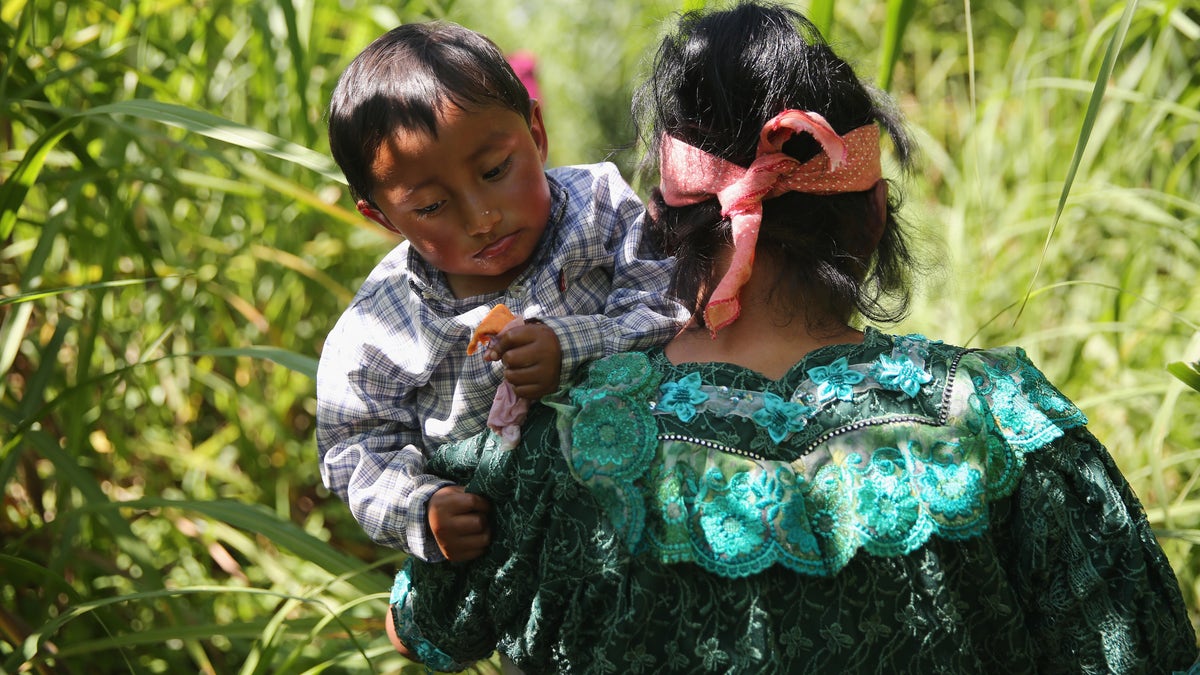
TALISMAN, MEXICO - AUGUST 01: An Indigenous family walks from Guatemala into Mexico after illegally crossing the border at the Suchiate River on August 1, 2013 in Talisman, Mexico. They passed directly under a bridge with a Mexican immigration checkpoint. Thousands of Central Americans pass illegally into Mexico daily, many on the first leg of their long and perilous journey north towards the United States. (Photo by John Moore/Getty Images) (2013 Getty Images)
In Latin America, there are more than 23.5 million indigenous women and around 5 million of them live in Mexico. Some of them are so impoverished and face such discrimination that they literally have given birth on the street.
Last year, an indigenous Mexican woman was turned away from a state health clinic in Oaxaca and she wound up giving birth to her baby on the lawn. After her case was published, another half dozen similar stories came to light.
We need to acknowledge, honor and learn from all the great work that these and many other indigenous leaders are doing around the world.
In Mexico, poverty, language barriers and lack of access to health care contribute to an alarming maternal mortality, which is twice that of the United States, according to the World Health Organization.
Many of the indigenous women migrate from rural communities to the big cities, where they are mainly occupied as domestic workers. In Mexico, there are 2.3 million domestic workers with no job security, pension or social security.
Also, around 72 percent of indigenous Mexicans live in poverty compared with 42.6 percent of the non-indigenous. The poorest states are Chiapas, Oaxaca and Guerrero, according to Mexican government figures.
The United Nations recently held the first World Conference on Indigenous Peoples within the United Nations Permanent Forum on Indigenous Issues (UNPFII) in New York.
One theme that cannot be overlooked is the plight of indigenous women.
In Mexico we have worked to build up the leadership of indigenous women through Semillas ("Seeds"), a member of the International Network of Women's Fund. With the support of the MacArthur Foundation, we ran a women’s indigenous leadership program that supported a new group of indigenous leaders to influence society and governmental institutions.
These women have been outspoken against gender violence and advocate for improved health of women and children, economic development, property land rights and other issues.
Nevertheless, the international indigenous movements are aware that they have not overcome all the obstacles, especially those related to cultural rights and discrimination.
There is a critical mass of leadership and women are showing that they can play an important role and be in any place or institution where they can offer their knowledge and influence to build a better world.
In Nicaragua, Myra Cunningham was the first doctor of the Miskito ethnic group and the first woman governor of the autonomous region. She was also the first indigenous woman to receive an Honorary Doctorate from the National Autonomous University of Mexico.
In Guatemala, Otilia Lux de Coti, a Maya Quiche indigenous woman, was Minister of Culture and Sports and a member of Congress for the WINAQ Political Movement. She also was the Vice President of the United Nations Permanent Forum on Indigenous Issues from 2001 to 2007.
In Mexico, Martha Sánchez who is one of the former fellows of Semillas’ leadership program, created the House of Heath for Indigenous Women in Guerrero. Today she is part of the Council of UNWOMEN in Latin America, and will be part of the Mexican governmental delegation for this upcoming World Indigenous Conference.
We need to acknowledge, honor and learn from all the great work that these and many other indigenous leaders are doing around the world.
This is the time to open doors and diverse spaces to embrace indigenous women leaders so they can work, from the local to international level, in making a difference to build the solutions for a better world.
